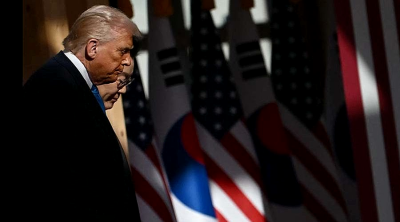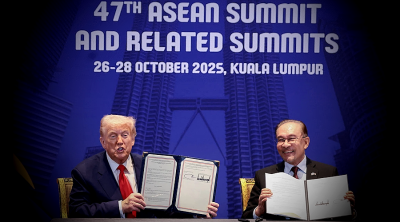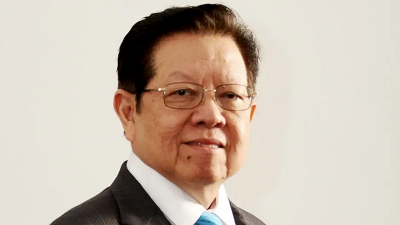
In a recent op-ed (“Trump tariff shock: Resilience, not retaliation,” 8 April 2025), EMIR Research argued that President Trump’s sweeping tariffs—targeting Malaysia and others—reflect political posturing more than sound economic strategy.
Crucially, Malaysia’s refusal to retaliate may prove to be the wiser course, preserving investor confidence, protecting domestic industries, and reinforcing its standing as a proponent of rules-based trade.
This follow-up explores how “resilience, not retaliation” can be operationalized through concrete steps to strengthen Malaysia’s economy, diversify supply chains, and seize opportunities in a shifting global order.
Counter-tariffs often amount to economic self-sabotage for smaller, trade-dependent nations.
With Malaysia’s current average Most Favored Nation tariff rate standing at just 5.6 percent (2023), any “reciprocal” move would be disproportionate—and economically harmful.
Moreover, it risks provoking harsher counter-measures from an administration that has shown little hesitation in escalating trade disputes.
Rather than “shoot ourselves in the foot,” it’s far more prudent for a trade-dependent nation to remain calm, letting the US bear the brunt of its own disruptive policy.
Countries that avoid tit-for-tat responses help contain global uncertainty and prevent broader economic slowdowns—second-order risks that are already material for commodity-exporting economies like Malaysia.
By choosing not to retaliate, Malaysia helps contain the shock, keeping it largely confined to the US and the directly affected industries.
The old adage, “when the US sneezes, the world catches a cold,” belongs to a different era, when America’s share of global GDP was significantly larger.
Today, with many countries having diversified away from excessive reliance on US trade and the dollar, the contagion effect is far less severe—provided we avoid overreaction.
Against this backdrop, Malaysia’s decision to remain measured sends a stabilizing signal to global investors.
Amid rising protectionist rhetoric, a predictable, rules-based environment becomes increasingly appealing.
Malaysia can thus safeguard foreign direct investment (FDI) inflows, avoid market volatility, and maintain momentum on its long-term development goals.
What ‘resilience, not retaliation’ looks like
Rather than turning inward behind protective tariffs, Malaysian companies should seize this moment to climb the value chain.
Targeted investments in research and development (R&D), workforce upskilling, and automation will ensure Malaysian products remain globally competitive.
Innovation-led import substitution—replacing select foreign inputs with high-quality domestic alternatives—must be driven by technology and talent, not tariffs and complacency.
Overreliance on a single major export destination makes businesses vulnerable to geopolitical shifts.
Malaysia’s proactive entry into the Regional Comprehensive Economic Partnership (RCEP), the Comprehensive and Progressive Agreement for Trans-Pacific Partnership (CPTPP), and BRICS+ opens doors to new markets.
Identifying weak links in supply chains and duplicating critical nodes can reduce exposure.
Whether through sourcing alternatives, parallel production lines, or tapping new consumer bases, diversification is the bedrock of resilience.
To further insulate the economy, exporters should increase the use of ringgit, yuan, yen, and other non-USD currencies.
Promoting local-currency settlements and expanding currency swap lines will mitigate the impact of US rate hikes and lessen vulnerability to dollar-centric shocks.
Resilience also requires investing in tech and talent. A future-ready workforce—equipped in AI, quantum computing, and green technologies—can drive productivity while insulating firms from geopolitical disruptions (e.g., sanctions or export controls).
Stronger industry-academia partnerships, improved KPIs for research institutions, and well-structured grant mechanisms are essential to accelerate commercialization and move beyond low-margin assembly.
Malaysia’s MyDIGITAL blueprint and National AI Office provide a roadmap for digital transformation.
Regulatory sandboxes, particularly under the National Technology and Innovation Sandbox (NTIS), can unlock local solutions in logistics, manufacturing, and finance—reducing reliance on foreign vendors.
Adopting Input-Output-Outcome-Impact frameworks will help ensure both public and private tech investments yield tangible returns.
Accelerating supply chain diversification, especially in electronics
Electronics account for over 40 percent of Malaysia’s exports.
While most high-tech components remain exempt from US tariffs for now, this buffer can vanish if American interests shift.
Malaysian semiconductor firms should therefore treat their current privileged status as a temporary reprieve.
Strategizing with industry peers—such as wafer fabs and assembly plants—to “war-game” possible tariff scenarios is an immediate priority.
This grace period should be used to diversify markets and upgrade technological capacity. Strategies include investing in quantum-resistant chips, cultivating alternative clients in high-growth areas (such as China’s AI-driven sectors), and renegotiating terms with US buyers for longer-term stability.
Historically, Malaysia has been a hub for semiconductor assembly and testing. To move up the value chain, we must expand into chip design, wafer fabrication, and advanced R&D.
This shift requires tax incentives, grants, and targeted workforce development.
Capturing more value domestically will reduce exposure to policy shocks and elevate Malaysia’s strategic importance in global supply chains.
Meanwhile, the trilateral semiconductor collaboration among China, Japan, and South Korea highlights a broader regional pivot toward self-sufficiency.
Malaysia—an ASEAN linchpin with neutral diplomacy and proven manufacturing capacity—is well-positioned to embed itself in these emerging networks.
Engagement with all major economies, from the US and Taiwan to the BRICS+ bloc, ensures risk is spread while opening channels for tech transfer and investment to further elevate Malaysia’s capabilities in design, production, and research.
Malaysia’s 2025 ASEAN Chairmanship offers a platform to lead deeper regional integration under the ASEAN+3 (China, Japan, South Korea) framework.
By championing initiatives in joint R&D, infrastructure, and AI ethics, Malaysia can help to strengthen collective economic resilience across Southeast and Northeast Asia.
Simultaneously, deeper ties with BRICS+ unlock access to alternative funding, non-USD payment mechanisms, and emerging markets.
Stronger ties with Brazil, India, Russia, and others can support exports, attract capital for climate-friendly infrastructure, and foster joint development of green technologies.
RCEP, CPTPP, and other trade accords provide preferential tariffs and simplified rules of origin—potent incentives for multinational firms to channel investment through Malaysia.
These frameworks help local electronics firms tap into vast ASEAN consumer markets (and beyond) and streamline digital trade, which is critical for real-time supply chain visibility and e-commerce.
Logistics readiness is key. With tariffs looming, the ability to pivot quickly is a competitive advantage.
Investment in ports, rail (e.g., East Coast Rail Link), and air logistics ensures exporters can access alternative routes.
High-value electronics also require precise handling and fast delivery, reinforcing the need for upgraded infrastructure.
Malaysia’s expanding data center ecosystem will further support smart manufacturing and global supply chain visibility.
Cloud infrastructure and AI tools can power predictive maintenance, real-time analytics, and just-in-time production—cornerstones of modern supply chain resilience.
This balanced posture allows Malaysia to mediate between rival blocs while turning its strategic geography and diplomatic credibility into competitive advantages. To sustain this momentum, Malaysia must double down on innovation and resilience.
Positioning middle powers in a shifting global order
Malaysia must continue to practice active neutrality, engaging both US and Chinese tech ecosystems to avoid overreliance on any single power.
This balanced posture allows Malaysia to mediate between rival blocs while turning its strategic geography and diplomatic credibility into competitive advantages.
Embracing multilateralism is equally essential. ASEAN coordination, combined with RCEP and CPTPP membership, helps Malaysia avoid geopolitical crossfire and stabilize its export environment.
At the same time, BRICS+ engagement expands funding and trade options beyond the dollar-based system, enhancing economic autonomy.
To sustain this momentum, Malaysia must double down on innovation and resilience—investing in AI, advanced manufacturing, data infrastructure, and local currency mechanisms.
Boosting domestic production of key technologies (e.g., semiconductors, green energy) will reduce exposure to foreign disruptions while driving long-term growth.
Finally, Malaysia should champion a rules-based order in collaboration with fellow middle powers like Japan, the EU, and Canada.
Transparent governance and stable trade policies are increasingly valuable in a volatile global landscape.
By leading through consistency and pragmatism, Malaysia can help shape a fairer, more predictable global trade architecture.
Far from being a destabilizing force, today’s global tensions offer Malaysia a unique opportunity to stand out as a beacon of stability, neutrality, and innovation.
These qualities naturally attract re-shored supply chains and fresh foreign investment.
In this context, shocks like the US tariff wave and the shift toward de-dollarization are not just threats—they’re also catalysts for transformation.
By modernizing industry, deepening capital markets, and forging new trade corridors, Malaysia can turn short-term disruption into long-term strategic advantage.
In doing so, it strengthens not only its own economic resilience but also its relevance in a rapidly evolving global order.
(Dr Rais Hussin is the Founder of EMIR Research, a think tank focused on strategic policy recommendations based on rigorous research.)
ADVERTISEMENT
ADVERTISEMENT








































